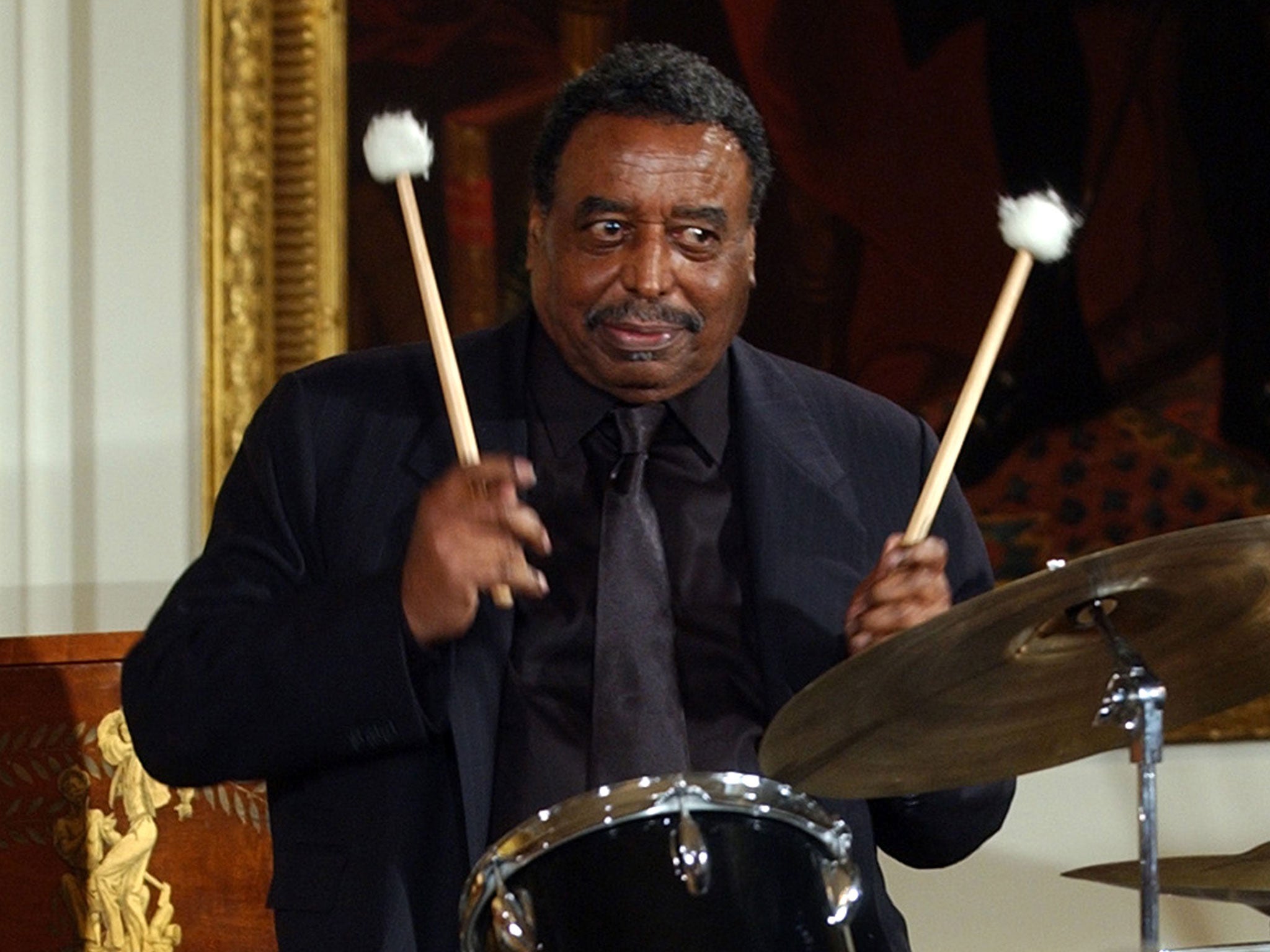Chico Hamilton: Musician
Drummer and bandleader whose quintet became acclaimed for its smooth, sophisticated style of jazz

Still relatively unusual today, the idea of a drummer being the bandleader in a jazz quintet was first attempted in the 1950s. Along with Max Roach and Art Blakey, one of the earliest examples, and for a while the most popular, was that of Chico Hamilton. Whereas Blakey and Art were establishing what came to be known as hard-bop, Hamilton’s quintet prominently featured the sounds of European classical music, using a cello and often the flute.
An early version of this group was seen to great effect in the movie Jazz On A Summer’s Day (1960), filmed at the 1958 Newport Jazz Festival. Two of the most striking sequences showed his cellist Fred Katz warming up on unaccompanied Bach, and then the quintet’s original tune “Blue Sands”. The flute solo was brutally edited but the hypnotic background to the guitar, provided by mallets and tom-toms, with Hamilton sweating under the spotlights, was intact.
A native of Los Angeles, he had a continuing relationship with the world of film and television, doing soundtrack work on films such as the Bing Crosby/Bob Hope vehicle The Road to Bali (1952) and, as early as 1941’s You’ll Never Get Rich, playing behind Fred Astaire and the Delta Rhythm Boys vocal group. In 1957 his quintet had a significant role in Alexander Mackendrick’s classic film The Sweet Smell of Success, where the guitarist of his onscreen group (dubbed on the soundtrack by Hamilton’s real band member) is subject to the machinations of Tony Curtis and Burt Lancaster’s characters. Chico’s brother was the actor Bernie Hamilton, a mainstay of the Starsky and Hutch series.
Hamilton grew up in Watts and attended the famous Jefferson High School, where schoolmates formed a jazz group joined by locals such as Dexter Gordon and Charles Mingus. Before service in the Second World War he was sufficiently adept to work briefly with luminaries such as Count Basie and Duke Ellington, whose respective drummers, Jo Jones and Sonny Greer, were among his idols. After the war, finding the touring band scene less than buoyant, he became the house drummer of the Hollywood nightclub Billy Berg’s, and the regular percussionist for lucrative tours by the singer Lena Horne.
His rise to fame began in 1952 as a member of the Gerry Mulligan quartet with Chet Baker, which Hamilton claimed held its first rehearsals in his living room. He recorded under his own name with Horne’s rhythm section and then formed his unconventional quintet, whose polite but groovy sounds gained immediate acceptance. With Fred Katz joined by guitarist Jim Hall and Hamilton’s contemporary, the flautist/saxophonist Buddy Collette, he exploited the current fashion for “chamber jazz” with allusions to European counterpoint. “Jazz doesn’t have to be loud”, he said at the time. “It can swing. And be soft, too.”
As well as Hall, number of musicians over the years began their careers with Hamilton such as the bassist Ron Carter, guitarists Gabor Szabo and John Abercrombie and a notable series of saxophonists in Eric Dolphy, Charles Lloyd and Arthur Blythe. Like other flexible bandleaders, he allowed himself to be influenced by his sidemen and to move with the times stylistically. His 1966 album The Dealer, with Larry Coryell on guitar and Archie Shepp sitting in on piano in “For Mods Only”, was almost unrecognisable from his earlier work.
At this period he took the step of founding a music production company to create advertising jingles and background music, employing among others the husband-and-wife team of Jimmy and Jeannie Cheatham (celebrated in one of the pieces on The Dealer). The year before, with his quartet working again for Lena Horne, he had visited London, where he contributed the music to Roman Polanski’s film Repulsion (playing on the soundtrack with British musicians including flautist Johnny Scott). A number of other, mainly European film-makers called on him as a composer, and in 1994 he was the subject of a documentary by the German director Julian Benedikt, Chico Hamilton: Dancing To A Different Drummer.
His composing and production activity allowed him to cease regular touring from the late 1960s onwards, although he frequently assembled new groups, often under the name of Euphoria. In 1987 he became one of the founders of New York’s New School University course, the Jazz and Contemporary Music Program, and took a hands-on approach to educating students. Among many awards he was granted a Jazz Masters Fellowship by the National Endowment of the Arts in 2004 and in 2006 was nominated to the President’s Council on the Arts. A group of new recordings in celebration of his 85th birthday was matched by a similar burst of activity in 2011, following the death of his wife of 65 years, Helen.
Several of his earlier songs gained subsequent dance-floor success, among them “For Mods Only”, “Conquistadores” (1965) and “Strut” (1980), while others such as “El Toro” (1962) and “Mysterious Maiden” (1980) achieved remix status. Hamilton, however, disclaimed any populist ambitions, saying emphatically in a 2010 radio interview that “The music has not changed, it’s the people listening. I don’t make music for people, I make music for music’s sake.”
Foreststorn “Chico” Hamilton, drummer and composer: born Los Angeles 21 September 1921; married Helen (died 2008; one daughter, and one son deceased); died Manhattan 25 November 2013.
Join our commenting forum
Join thought-provoking conversations, follow other Independent readers and see their replies
Comments
Bookmark popover
Removed from bookmarks